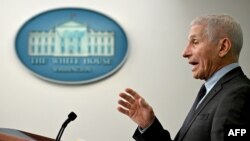Dr. Anthony Fauci, the U.S. health official celebrated and vilified as the face of the country's COVID-19 pandemic response, used his final White House briefing on Tuesday to denounce division and promote vaccines.
Fauci, who plans to retire soon as President Joe Biden's top medical adviser and top U.S. infectious disease official, has dealt with the thorny questions around health crises from HIV/AIDS to avian flu and Ebola.
But it was his handling of COVID — and his blunt assessments from the White House podium that Americans needed to change their behavior in light of the pandemic — that made him a hero to public health advocates while serving under President Donald Trump, a villain to some on the right and an unusual celebrity among bureaucratic officials used to toiling in obscurity. Fauci has regularly been subjected to death threats for his efforts.
True to form, Fauci used the final press briefing to strongly encourage Americans to get COVID vaccines and booster shots, and touted the effectiveness of masks, all of which became partisan totems in the United States.
The United States leads the world in recorded COVID-19 deaths with more than 1 million.
After 13 billion doses of COVID-19 vaccines given worldwide, Fauci said, there is "clearly an extensive body of information" that indicates that they are safe.
"When I see people in this country because of the divisiveness in our country ... not getting vaccinated for reasons that have nothing to do with public health, but have to do because of divisiveness and ideological differences, as a physician, it pains me," Fauci said.
"I don't want to see anybody hospitalized, and I don't want to see anybody die from COVID. Whether you're a far-right Republican or a far-left Democrat, doesn't make any difference to me."
Fauci is stepping down in December after 54 years of public service. The 81-year-old has headed the U.S. National Institute of Allergy and Infectious Diseases, part of the National Institutes of Health, since 1984.
The veteran immunologist has served as an adviser to seven U.S. presidents beginning with Republican Ronald Reagan. He made his first appearance at the White House press briefing in 2001.
Republican lawmakers including fierce critic Senator Rand Paul, with whom Fauci tangled during Senate hearings, have vowed to investigate him when they take control of the House of Representatives following November's congressional elections.
On Tuesday, Fauci said he "will absolutely cooperate fully" in any congressional oversight hearings launched by Republicans next year.









